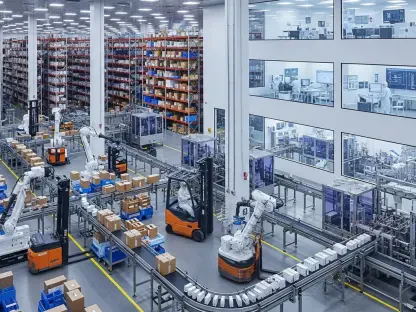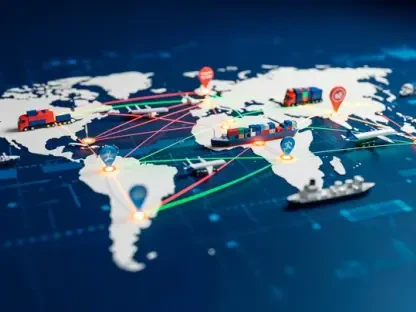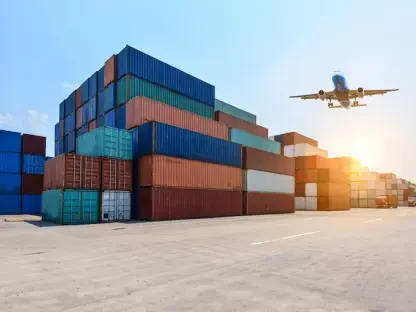The cold chain logistics industry stands at the brink of a technological revolution. Blockchain technology, once synonymous with cryptocurrencies, is now being integrated into cold chain logistics to drive transparency, traceability, and efficiency. This transformation is expected to escalate from USD 470 billion in 2024 to a staggering USD 1592.4 billion by 2034, growing at a 14.3% CAGR. With these advancements, the world of temperature-sensitive goods transportation and storage is set to become more reliable and efficient.
The Push for Transparency and Traceability
An Immutable Ledger for Cold Chain Logistics
Blockchain technology offers a decentralized and immutable ledger, which greatly enhances transparency and traceability in the supply chain. Every transaction and movement of goods is recorded in real-time on this ledger, ensuring the integrity and authenticity of data. This capability is crucial for cold chain logistics, where maintaining the right conditions is essential. For example, for temperature-sensitive products such as vaccines, food, and chemicals, blockchain ensures that any deviation from required conditions is immediately recorded and flagged for corrective action.
Real-time tracking enabled by blockchain technology allows for rapid responses to potential issues before they escalate into catastrophic losses. The decentralized nature of blockchain means that no single entity has control over the entire record, reducing the chances of data tampering or fraud. This is particularly valuable in global supply chains where multiple stakeholders are involved. The immutable nature of blockchain records makes them trustworthy, providing a single source of truth that all parties can rely on. This ensures that each participant in the supply chain has access to the same real-time data, which is essential for maintaining the quality and safety of temperature-sensitive goods.
Enhanced Stakeholder Collaboration
The integration of blockchain facilitates seamless data sharing among various stakeholders in the cold chain logistics sector, including manufacturers, distributors, and retailers. With blockchain, data is updated in real-time, providing end-to-end visibility across the supply chain. Such transparency helps in optimizing inventory management and minimizing spoilage. When all stakeholders have access to the same data, it becomes easier to coordinate efforts, streamline processes, and make informed decisions.
This enhanced collaboration among stakeholders not only ensures that goods maintain their quality but also streamlines operational efficiencies. By providing a single source of truth, blockchain reduces misinformation and enhances decision-making processes. This is particularly important in cold chain logistics, where any delay or miscommunication can lead to the spoilage of perishable goods, resulting in significant financial losses. Moreover, enhanced transparency builds trust among stakeholders, making it easier to form long-term partnerships and collaborations, which are essential for the successful implementation of such advanced technologies.
Cost Savings and Efficiency Gains
Minimizing Intermediaries
One of the significant benefits of blockchain technology is its ability to reduce the need for intermediaries. Traditional cold chain logistics involves numerous paperwork and manual processes, leading to errors and delays. Blockchain automates these processes, significantly reducing paperwork and errors. This automation ensures that the data entered into the system is accurate and tamper-proof, thereby reducing the chances of fraud and ensuring that all transactions are transparent.
Cost savings from reduced intermediary involvement and enhanced accuracy translate into substantial cost reductions. Companies can thus allocate resources more efficiently, passing on the cost savings to consumers. With fewer intermediaries involved, the logistics process becomes more streamlined, allowing companies to reduce lead times and improve delivery schedules. This not only enhances customer satisfaction but also enables companies to respond more effectively to market demands. Additionally, the reduced risk of data breaches and fraud further adds to the overall cost savings and efficiency gains.
Optimizing Transportation and Logistics
By providing real-time updates and insights, blockchain helps in optimizing transportation routes and logistics operations. This capability is particularly valuable for maintaining the required temperature conditions for perishable goods. The technology allows for better forecasting and demand planning, ensuring the right products reach the right locations at the right time. Blockchain can be integrated with other technologies, such as the Internet of Things (IoT) and Artificial Intelligence (AI), to enhance its capabilities further.
For example, IoT sensors can monitor temperature and humidity levels in real-time and feed this data into the blockchain system. AI algorithms can then analyze this data to predict potential issues and recommend corrective actions. Such an integrated approach ensures a robust and proactive cold chain management system, capable of addressing issues before they escalate. This not only helps in maintaining product quality but also reduces waste and improves overall efficiency. By optimizing transportation and logistics operations, companies can achieve significant cost savings and improve their bottom line.
Regulatory Compliance and Safety Standards
Meeting Stringent Regulations
The cold chain logistics sector is highly regulated, especially concerning pharmaceuticals and food products. Stringent regulations demand comprehensive records to ensure product safety and efficacy. Blockchain’s immutable ledger provides a reliable solution for maintaining these records, ensuring thorough compliance with all safety standards. By automating compliance reporting, blockchain reduces the administrative burden on companies. This not only makes the compliance process more efficient but also ensures that all records are accurate and up-to-date.
Additionally, blockchain provides a transparent audit trail that regulators can trust, further ensuring that all safety protocols are meticulously followed. This transparency is crucial for maintaining product integrity and safety, as any deviations from the required standards can be quickly identified and addressed. Moreover, blockchain’s ability to record every transaction and movement in the supply chain makes it easier for companies to comply with ever-changing regulations, thereby reducing the risk of penalties and fines. This is particularly important in industries where regulatory compliance is critical, such as pharmaceuticals and food products.
Building Consumer Trust
In an era where consumers are highly aware and concerned about the safety and origin of products, blockchain provides an added layer of trust. By offering transparent and traceable records, blockchain technology can address consumer concerns about product integrity. This trust can extend to various industries, including pharmaceuticals, food, and beverages, thereby enhancing brand loyalty and consumer confidence. Consumers can verify the authenticity of products and their journey through the supply chain, ensuring that they are receiving goods that meet the highest standards of quality and safety.
This transparency not only builds consumer trust but also enhances the reputation of companies that adopt blockchain technology. By demonstrating a commitment to transparency and traceability, companies can differentiate themselves from their competitors and attract more customers. Additionally, the use of blockchain can help companies address sustainability concerns by providing verifiable data on the environmental impact of their products. This can further enhance brand loyalty and consumer confidence, driving long-term growth and success.
Adoption of Advanced Technologies
Integration with IoT and AI
Blockchain technology does not operate in isolation. Its integration with other advanced technologies such as the Internet of Things (IoT) and Artificial Intelligence (AI) further enhances its capabilities. IoT devices can continuously monitor and report conditions such as temperature and humidity in real-time, feeding this data into the blockchain ledger. This real-time monitoring ensures that any deviations from required conditions are immediately recorded and addressed, thereby maintaining the quality and safety of temperature-sensitive goods.
AI can analyze this data to predict potential issues and recommend corrective actions. Such an integrated approach ensures a robust and proactive cold chain management system, capable of addressing issues before they escalate. This not only helps in maintaining product quality but also reduces waste and improves overall efficiency. By leveraging the power of AI and IoT, companies can enhance their forecasting and demand planning capabilities, ensuring that the right products reach the right locations at the right time. This integration of advanced technologies with blockchain can significantly enhance the efficiency and reliability of cold chain logistics operations.
Smart Contracts for Automation
Smart contracts, which execute automatically when specific conditions are met, further automate processes in cold chain logistics. For instance, payments can be released automatically once goods have been delivered and conditions have been verified. This automation reduces delays and enhances operational efficiency. Smart contracts also ensure that all contractual terms are met without requiring manual intervention. This capability reduces disputes and ensures smooth transactions, further driving cost efficiencies and reliability.
By automating key processes, smart contracts also reduce the risk of human error and fraud, thereby enhancing the overall security and integrity of the cold chain logistics system. Companies can use smart contracts to streamline various aspects of their operations, from procurement and production to distribution and delivery. This not only improves efficiency but also enhances the ability to respond quickly to market demands and changes. The use of smart contracts in cold chain logistics is expected to drive significant improvements in operational efficiency and cost savings, further enhancing the overall competitiveness of companies in this sector.
Regional Insights and Market Trends
North America Leading the Way
In North America, numerous alliances and partnerships are forming among technology suppliers, logistics firms, and government agencies. These collaborations aim to deploy and expand blockchain solutions across the cold chain logistics network. Such regional initiatives are setting the benchmark for global standards in blockchain adoption. Innovative developments are also being driven by the region’s strong focus on regulatory compliance and technological advancements. This environment fosters growth and adoption of blockchain solutions in cold chain logistics.
Several high-profile projects and pilot programs are underway, demonstrating the potential of blockchain to enhance transparency, traceability, and efficiency in cold chain logistics. North American companies are leading the way in the adoption of blockchain technology, setting the stage for its global implementation. The region’s strong regulatory framework and emphasis on innovation provide a conducive environment for the development and deployment of blockchain solutions. This not only enhances the efficiency and reliability of cold chain logistics operations but also sets the stage for future advancements in this area.
Expanding Adoption in Asia Pacific
The cold chain logistics industry is on the verge of a significant technological breakthrough with the integration of blockchain technology. Known initially for its role in cryptocurrencies, blockchain is now being adapted to enhance transparency, traceability, and efficiency in the logistics of temperature-sensitive goods. This modern transformation is predicted to propel the market from USD 470 billion in 2024 to an astounding USD 1592.4 billion by 2034, reflecting a compound annual growth rate (CAGR) of 14.3%.
Blockchain technology brings a myriad of benefits to cold chain logistics. For instance, it provides an immutable ledger that records every transaction and movement within the supply chain, ensuring that all parties have access to reliable and verifiable data. This heightened level of transparency fosters trust among stakeholders, reduces the likelihood of fraud, and ensures compliance with regulatory standards.
Additionally, blockchain enhances the traceability of goods by providing a detailed, real-time tracking system. This is particularly vital for products like pharmaceuticals, fresh produce, and other perishables that require precise temperature control to maintain quality and safety. With improved traceability, issues such as spoilage, contamination, and delays can be identified and addressed more swiftly.
As the cold chain logistics sector embraces blockchain, the overall reliability and efficiency of transporting and storing temperature-sensitive goods are expected to dramatically improve. This evolution will not only meet rising consumer demands but also set new standards in global supply chain practices, ensuring that products reach their destinations in optimal condition.









